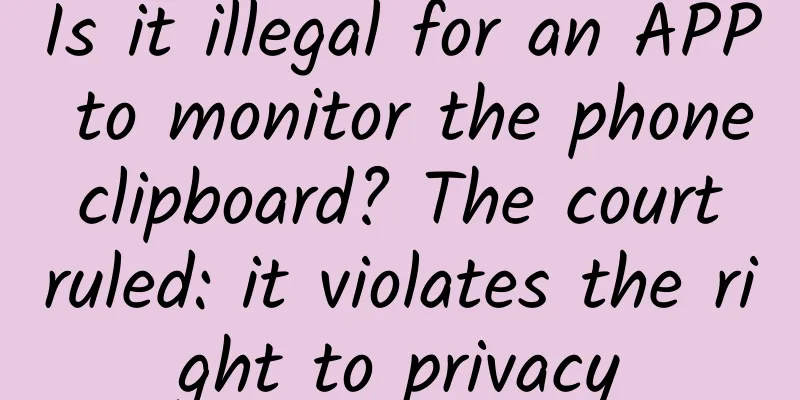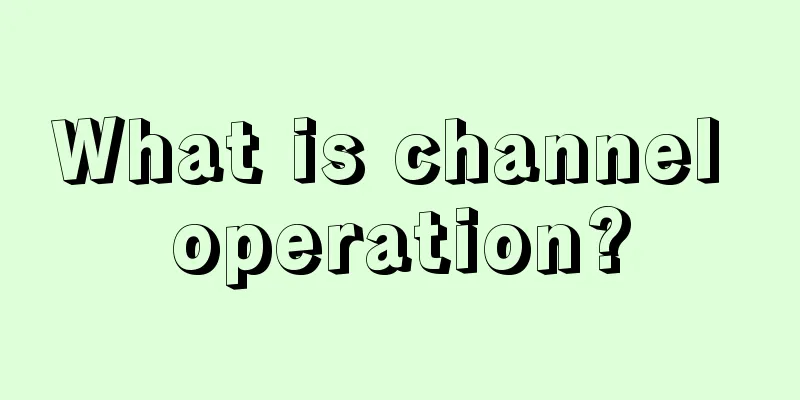Is it illegal for an APP to monitor the phone clipboard? The court ruled: it violates the right to privacy

|
In this Internet age, many users believe that mobile phone apps are eavesdropping on them - this suspicion is not unreasonable, because many apps do monitor users' clipboards and analyze their private information, which is actually illegal, and there have been examples of court rulings. According to 21st Century Business Herald, the Guangzhou Internet Court recently ruled on a case in which a shopping app read the user's mobile phone clipboard without the user's permission. The court found that the app violated the user's privacy rights. According to the Guangzhou Internet Court, when Lin was using the "Haogou" APP operated by the "Haogou" company, he discovered that the APP monitored and collected mobile phone clipboard information without the user's consent. He also provided a self-written "Haogou APP Clipboard Reading Information Technology Analysis Report" and an appraisal opinion issued by a judicial appraisal institute. Lin believes that the clipboard can store personal information involving privacy, such as personal ID number, mobile phone number, photos, etc., but the "Privacy Policy" of the "Haogou" APP does not have any relevant instructions for collecting mobile phone users' clipboard information, nor does it fulfill its obligation to inform and remind users to obtain their consent. The actions of "Haogou" company infringe upon his personal information rights and privacy rights. Lin then sued Haogou to the Guangzhou Internet Court, demanding that the company stop the infringement and delete the information collected without permission, apologize, eliminate the impact, and compensate for mental damages of 1 yuan. The defendant argued that in order to improve the user experience, the "Haogou" APP needs to obtain clipboard data, but only uploads data that meets the format requirements to the network server for analysis and matching with corresponding products. If there is a corresponding product, it will jump; if there is no corresponding product, it will be discarded and not stored. In this case, whether the "Haogou" APP violated Lin's privacy rights and what kind of infringement liability the company should bear if it constituted an infringement became the key points of the case. The court held that since the facts in the case occurred before the implementation of the Civil Code, it was determined in accordance with the relevant provisions of the General Principles of the Civil Law that the "Haogou" APP was engaged in monitoring and reading clipboard information. As the actual operator and network service provider of the "Haogou" APP, "Haogou" company failed to proactively inform Lin of the above situation and did not obtain Lin's permission, and was therefore at fault. It should bear tort liability to Lin in accordance with the law. Therefore, the court ruled that the way for Haogou to bear responsibility was to issue a written apology statement to Lin. However, as for Lin's request for Haogou to delete the personal information that had been collected, the request was not enforceable because it did not clearly specify the specific content to be deleted, and the court did not support it.
|
Recommend
up to date! Data rankings of 59 information flow advertising platforms!
The following is the latest traffic ranking of 59...
How long can African kids continue to use signboards to market?
Recently, a video of African children holding sig...
Baby language enlightenment class
Introduction to baby language enlightenment course...
Jiaxin Customer Service: A Transformer of Enterprise Customer Service in the "Internet +" Era
With the deepening of the Internet, mobile office...
In the second half of the Internet, will the traffic dividend disappear? There are 3 operating directions
In a speech this year, Xing Ge mentioned that aft...
In today's world where content is king, here are nine rules for successful content marketing!
In today's world where content is king, many ...
The resumption rate of work in 24 cities exceeds 80%. What is the specific situation? Attached is a list of resumption rates in various regions!
As the epidemic situation eases, many areas have ...
Taobao Alliance Competitive Product Analysis Report
Online shopping has become a lifestyle for contem...
Google will face the highest fine in history: Android system monopoly may be broken
Google faces a record fine from the European Unio...
Advanced checklist for private domain operators
What is a private domain operator ? As the name s...
The data logic behind the year-end growth of APP
The global app economy is in a period of rapid gr...
Copywriting Basics Series | How to improve a 70-point copywriting score to a 90-point score?
You have carefully analyzed and digested the prom...
How do technical leaders transform themselves as they advance in entrepreneurship?
[[156060]] When a product is created from scratch...
5 obstacles that new programmers must overcome
Many people want to become a programmer or switch...
As long as the information flow optimizer does this step well, he can easily improve the conversion rate!
Many friends asked: I have been working as an opt...









![Gentle White is Not White · Douyin 0-cost project: single-day income of 500, no work release, no account maintenance [video course]](/upload/images/67cc2821117aa.webp)